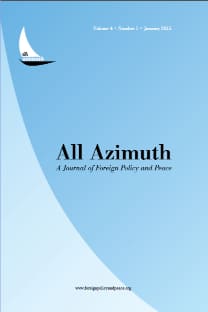Humanitarian Intervention as a ‘Responsibility to Protect’: An International Society Approach
Humanitarian Intervention as a ‘Responsibility to Protect’: An International Society Approach
humanitarian intervention, responsibility to protect, international society, sovereignty non-intervention,
___
- Abiew, Francis Kofi. “Assessing Humanitarian Intervention in the Post-Cold War Period: Sources of Consensus.” International Relations 14 2 (August 1998): 61-90.
- ––– . The Evolution of the Doctrine and Practice of Humanitarian Intervention. The Hague: Kluwer Law International, 1999.
- Annan, Kofi. “Two Concepts of Sovereignty.” The Economist, September 16, 1999.
- Ayoob, Mohammed. “Humanitarian Intervention and State Sovereignty.” International Journal of Human Rights 6 1 (2002): 81-102.
- Brown, Chris. “World Society and the English School: An ‘International Society Perspective’ on World Society.” European Journal of International Relations 7 4 (2001): 423–41
- Bull, Hedley. Anarchical Society. New York: Columbia University Press, 1995.
- ––– . Conclusion to Intervention in World Politics, edited by Hedley Bull, 181- 95. Oxford: Clarendon Press, 1984.
- In To Loose the Bands of Wickednes: International Intervention in Defence of Human Rights, edited by N. S. Rodley, 14-42. London: Brassey’s, 1992.
- Schnabel, Albrecht. “Humanitarian Intervention: A Conceptual Analysis.” In Peacekeeping at a Crossroads, edited by S. Neil Mac Farlane and Hans-Georg Ehrhart, 19-44 . Clementsport: The Canadian Peacekeeping Press, 1997.
- Shue, Henry. “Limiting Sovereignty.” In Welsh, Humanitarian Intervention and International Relations, 11-28.
- Shulong, Chu. “China, Asia and Issues of Sovereignty and Intervention.” Pugwash Occasional Papers 2 1 (January 2001).
- Stanton, Kimberly. “Pitfalls of Intervention.” Harvard International Review 16 1 (Fall 1993): 14-16.
- Vincent, R. J.. Human Rights and International Relations. Cambridge: Cambridge University Press, 1986.
- Walzer, Michael. Just and Unjust Wars. New York: Basic Books, 2000.
- Weiss, Thomas G.. “The Politics of Humanitarian Ideas.” Security Dialogue 31 1 (March 2000): 1-23.
- –––. “The Sunset of Humanitarian Intervention? The Responsibility to Protect in a Unipolar Era.” Security Dialogue 35 2 (2004): 135-153.
- Welsh, Jennifer M. ed. Humanitarian Intervention and International Relations. Oxford: Oxford University Press, 2004.
- Welsh, Jennifer M.. “Taking Consequences Seriously.” In Welsh, Humanitarian Intervention and International Relations, 52-70.
- Wheeler, N..“Humanitarian Responsibilities of Sovereignty.” In Welsh, Humanitarian Intervention and International Relations, 29-51.
- ––– . Saving Strangers. Oxford: Oxford University Press, 2001.
- Wheeler, Nicholas and Morris, Justin. “Humanitarian Intervention and State Practice at the End of the Cold War.” In International Society after the Cold War: Anarchy and Order Reconsidered, edited by Rick Fawn and Jeremy Larkins, 135 – 171. London: Macmillan Press Ltd., 1996.
- ISSN: 2146-7757
- Yayın Aralığı: 2
- Başlangıç: 2012
- Yayıncı: Dış Politika ve Barış Araştırmaları Merkezi, İhsan Doğramacı Barış Vakfı
Mediation: The Best Way Forward in Conflict Prevention and Resolution
Monica Rafael SİMOES, Ç. Esra ÇUHADAR
Norway and Turkey: Possibilities of Cooperation through the Eyes of Turkish Opinion-Makers
Daniel Heradstveit, Siri Neset, G. Matthew Bonham
Humanitarian Intervention as a ‘Responsibility to Protect’: An International Society Approach
Europe in Transition: Lessons to be Learned
Good Governance of the Security Sector in Turkey
Willem van Eekelen, Merijn Hartog
Ç. Esra Çuhadar, Monica Rafael Simoes
Humanitarian Intervention as a Responsibility to Protect': An International Society Approach
